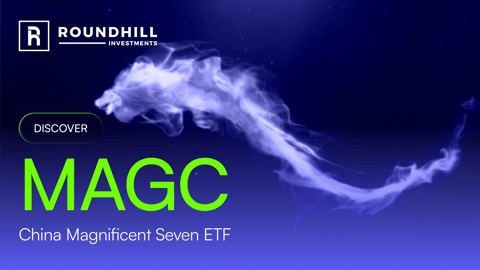Solving China’s Stock Market Diversification Problem
Historically, emerging market equities have earned a spot in investor portfolios under the premise of portfolio diversification and higher return potential, albeit with higher risk. In traditional emerging market benchmarks, China – one of the largest economies in the world – is the largest country of influence, weighing in at 30%, roughly 10 percentage points higher than the second largest weight, India. The United States holds a significant influence within developed market benchmarks, commanding a 71% weight in the Bloomberg Developed Market Large & Mid Cap Index (as of July 26, 2024).

Investing in Chinese equities typically requires good timing and a high tolerance for volatility. More recently, Chinese equities have required a third attribute from investors: patience. A look at the Shanghai Composite Index illustrates the boom-and-bust potential associated with the broader Chinese equity market. The annualized 5-year return on the Shanghai Composite is 0.0%, an inadequate return given the heightened volatility profile.

But are broad-based benchmarks, like the Shanghai Composite, the right way to play what remains one of the largest and fastest-growing economies globally?
What are investors missing in China?
Investing in broader China indexes risks diluting exposure to the largest China stocks that are driving technological innovation and economic growth. Levered to one of the largest and most populated economies in the world, select Chinese mega-cap tech companies have competitive advantages through the economies of scale, solid fundamental footing, and extraordinary growth relative to their peers.
At Roundhill, we have identified a group of nine names – Tencent, Pinduoduo, Alibaba, Meituan, BYD, Xiaomi, JD.com, Baidu, and NetEase – which we have dubbed the “China Dragons” to represent their clear leadership as technological innovators within the Chinese economy.
Why are these nine stocks China’s market leaders?
As established leaders in the respective industries, the China Dragons continue to exhibit impressive growth. On the top line, these nine stocks have seen aggregate next twelve month sales estimates climb 27% since the end of 2021, compared to just 6% growth from China large-caps more broadly.

Drilling a level deeper, the group’s economies of scale have contributed to impressive net income growth. Since December of 2021, the group has seen forward twelve month net income estimates climb 70%, demonstrating their ability to maximize profitability and manage costs. Meanwhile, China large-caps have only seen forward net income grow about 8%.

Analysts are more optimistic on the China Dragons relative to China large-caps. Taken together, the China Dragons have 94% buy ratings of 420 covering analysts while China large-caps have about 86% buy ratings as a percentage of total coverage.
Who are the China Dragons?
Tencent: Tencent is one of the largest publicly traded companies in China, with specializations in investments, social networks, music, gaming, e-commerce, payments, artificial intelligence, and technology services.
PDD Holdings: Pinduoduo is a multinational commerce group, specializing in online retail and digital exchange via its own network of sourcing, logistics, and fulfillment provided by its portfolio companies.
Alibaba Group: Alibaba is well-known for its global commerce business, but is a major leader in cloud services, technology infrastructure, media, and entertainment.
Meituan: Meituan operates as a digital retailer for locally sourced products and services, renowned for selling vendor coupons, as well as providing mobile application services such as restaurant reviews.
BYD Co: BYD operates in the automotive and battery industry within China, known for its expanding hybrid vehicle offerings and EV research.
Xiaomi Corp: Xiaomi is a global telecommunications and consumer electronics company based in Beijing, known for mobile phones, smart watches, smartphone software, consumer durable and lifestyle products.
JD.com Inc: JD.com is a Chinese e-commerce company, renowned for its online direct sales strategy with a diverse portfolio of consumer products and services like consumer goods, appliances, technology, healthcare and insurance.
Baidu Inc: Baidu is a multinational technology company specializing in internet search engine services. As a leader in the industry, Baidu offers algorithmic search, news, voice assistance, cloud, and navigation services to its consumer base.
NetEase Inc: NetEase is known for its online PC and mobile gaming presence, while also offering email, advertising, and e-commerce services.
Going for Growth in China When Growth is Scarce
The China Dragons are growing rapidly, leveraging access to one of the fastest growing and most densely populated economies in the world. The group’s technological and innovative prowess have led to growth rates well ahead of competitive peers, fundamental characteristics that are valued by investors globally. How the investors opt to gain exposure is just as important as deciding to invest in the first place.
This information is provided solely as general investment education. None of the information provided should be regarded as a suggestion to engage in or refrain from any investment related course of action. Investing involves risk, loss of principal is possible.
Bloomberg Emerging Markets Large & Mid Cap Price Return Index is a float market-cap-weighted equity benchmark that covers 85% market cap of the measured market.
Bloomberg Developed Markets Large & Mid Cap Price Return Index is a float market-cap-weighted equity benchmark that covers 85% market cap of the measured market.
The Shanghai Stock Exchange Composite Index is a capitalization-weighted index. The index tracks the daily price performance of all A-shares and B-shares listed on the Shanghai Stock Exchange. The index was developed on December 19, 1990 with a base value of 100. Index trade volume on Q is scaled down by a factor of 1000.
The S&P 500® is widely regarded as the best single gauge of large-cap U.S. equities and serves as the foundation for a wide range of investment products. The index includes 500 leading companies and captures approximately 80% coverage of available market capitalization.
The MSCI EM (Emerging Markets) Index is a free-float weighted equity index that captures large and mid cap representation across Emerging Markets (EM) countries. The index covers approximately 85% of the free float-adjusted market capitalization in each country.
The MSCI EAFE Index is a free-float weighted equity index. The index was developed with a base value of 100 as of December 31, 1969. The MSCI EAFE region covers DM countries in Europe, Australasia, Israel, and the Far East.





